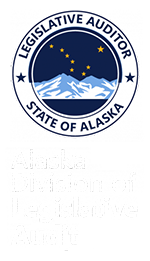| SUMMARY OF: | A Sunset Review of the Department of Community and Economic Development,Board of Dispensing Opticians, September 12, 2003. |
Purpose of the Report
In accordance with Title 24 and Title 44 of the Alaska Statutes (sunset legislation), we have
reviewed the activities of the Board of Dispensing Opticians. The purpose of this audit was to
determine if there is a demonstrated public need for the continued existence of the Board of
Dispensing Opticians.
Report Conclusions
Under AS 44.66.050(d)(4), part of a sunset review is to provide “an assessment of alternative
methods of achieving the purposes of the program.” In the prior audit we considered the merits
of regulating opticians through a registration process and placing primary reliance on the
successful completion of nationally recognized examinations to ensure competency.
Most states do not “regulate” or license opticians at all. According to the Opticians Association
of America, only 22 states license dispensing opticians. Texas has a voluntary registration
program – which allows the individual to advertise as a “registered optician” if they have met
certain established criteria related to competency. Such an approach may be a viable alternative
for Alaska.
Under this approach, an individual could advertise as being a registered optician once they
provided proof to the Division of Occupational Licensing (OccLic) that they had met the
necessary testing and continuing education requirements. Presumably, such designation would
have some commercial advantages, assuring consumers the practitioner had met an established
standard of competency.
The future operational viability of the board is questionable. In the long term, the number of
new applicants seeking licensure as opticians may be reduced significantly due to creation of
the optician assistant designation. Combined with fiscal instability brought on by licensing fee
revenues insufficient to cover the operating costs of the board, the long-term viability of the
Board of Dispensing Opticians(BDO) is problematic. Given these concerns, we recommend the
legislature not extend the termination date for the board. Accordingly, the board will terminate
operations at June 30, 2005.In our view, the public can be adequately protected by competition in the marketplace, ongoing
supervision of assistants, or professional standards already established for practicing opticians
and ophthalmologists.
Findings and Recommendations
If the legislature decides to extend the termination date for the Board of Dispensing Opticians
(BDO), we believe it is important for the board to take the following two actions.
Recommendation No. 1
The board should develop and propose legislation to clarify statutes related to the various aspects of dispensing optician licensing.
Opticianry statutes should be amended to address the following concerns:
The amount of apprentice training hours necessary for licensure should be clarified.
Currently, AS 08.71.110(a)(2)(A) states an individual must complete “at least 1,800
hours of training as an apprentice…”. In regulation, BDO specifies the individual
complete a board-approved course, accumulate 1,800 hours of training, and pass the
necessary examinations to be licensed in dispensing spectacles. The regulations also state
that in order for an individual to be licensed to dispense contact lenses they must
complete an additional 1,800 hours and pass the relevant national examination. State law
makes no distinction related to these endorsements.
Modification of apprentice registration requirements at AS 08.71.160.
Recognition, in statute, of a process to license individuals from other jurisdictions.
Recommendation No. 2
The Division of Occupational Licensing in conjunction with the board should increase
optician’s licensing fees to eliminate the cumulative deficit.
Another increase in optician’s licensing fees is necessary to eliminate the cumulative deficit.
Licenses are renewed every two years; therefore, the revenue generated in the renewal year
must be sufficient to fund most of the board’s costs of the nonrenewal or subsequent year. The
recent increase in licensing renewal fees for dispensing opticians and optician’s apprentices
appears to be sufficient to cover the board’s costs for the two-year period. Depending on the
amount of revenue collected in the nonrenewal year, the increased licensing fee may also reduce
a small portion of the board’s continuing deficit. Alaska Statute 08.01.065(c) requires fees for
an occupation to be set to approximate the regulatory costs for the occupation. We recommend
the board and OccLic review the regulatory costs and licensing fees to ensure that BDO
sufficiently eliminates the cumulative deficit and meets annual operating costs.

